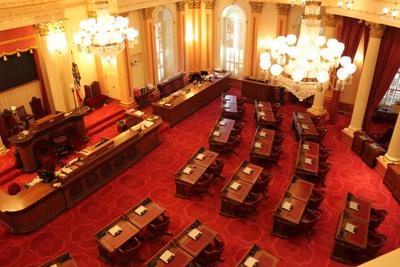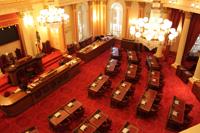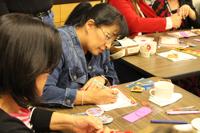
Senate Chamber at the California State Capitol. (By BenFranske/Wikimedia Commons)
This story was originally published by EdSource. Sign up for their daily newsletter.
Top Takeaways
- Assembly Bill 715, which underwent significant revisions in the past several months, will establish an Office of Civil Rights.
- An Antisemitism Prevention Coordinator within the new office would track incidents of antisemitism in schools and work with districts to address it.
- Those who oppose it, including the California Teachers Association, claim it could infringe on academic freedom and lead to greater inequities.
A bill to reduce antisemitism in California’s classrooms by creating a new, statewide Office of Civil Rights is headed to Gov. Gavin Newsom’s desk after a 35-0 vote by the state Senate late Friday, the last day of the legislative session.
Assembly Bill 715’s passage comes after months of negotiations with the bill’s opponents — including the California Teachers Association — which argued it could infringe on academic freedom and prioritize the rights of certain students over others.
“Everyone recognizes that we’ve got a problem and that we need to redress it,” said Assemblymember Rick Chavez Zbur, D-Hollywood, one of the bill’s authors alongside Assemblymember Dawn Addis, D-Morro Bay. There is a commitment, he said, to make sure “our schools are safe for all kids, including Jewish students and families who are facing such acute antisemitism right now.”
The bill
Several members of the Senate Education Committee acknowledged during a hearing on Wednesday that the updated bill had been pushed through with little time for public review.
“While this bill continues to focus on addressing antisemitism, it now also addresses the identification, prevention, and correction of discrimination and bias more broadly,” read the bill analysis.
These are the highlights, including key revisions:
- It creates a statewide Office of Civil Rights under the Government Operations Agency, which would be headed by an Antisemitism Prevention Coordinator. That coordinator would track and report antisemitism in schools, working with school districts and members of school communities to curtail it. The coordinator would serve with four other new positions in accompanying legislation, Senate Bill 48. There would be coordinators to prevent religious discrimination, race and ethnicity discrimination, gender discrimination and LGBTQ discrimination.
- The bill no longer establishes a new complaint process — and instead sticks to the existing Uniform Complaint Procedures.
- The revised bill no longer defines antisemitism or provisions to address a “specific antisemitic learning environment,” according to the bill analysis.
- It no longer requires the adoption of instructional materials to include discussions of Jewish people, Israel, or the Israeli-Palestinian conflict — and instead mandates that “teacher instruction shall be factually accurate and align with the adopted curriculum.”
While the bill won’t directly guide curriculum, Zbur said in an interview with EdSource that it will encourage school boards to adopt curricula that are unbiased.
“Because of the growth of antisemitism, both within California and around the nation, it’s a very proactive step to provide support to teachers and school districts about what is and what isn’t antisemitic and help them figure this out,” said Carol Kocivar, an education advocate who previously served as president of the California State PTA.
“Training is always important to ensure that the people who are delivering instruction actually do know what the law is and do know where those lines are crossed,” she said.
Support and opposition
The bill received support from several diversity caucuses, including California’s Black, Latino, and Asian American & Pacific Islander legislative caucuses. Its proponents have stressed that AB 715 will be a game-changer in reducing antisemitism in the classroom.
“Many of the people in this chamber could likely point to a time when they have felt disadvantaged,” said Sen. Akilah Weber Pierson, D-San Diego, on the Senate floor Friday. “But not everyone knows the feeling of being truly targeted simply because of the color of your skin, or the shape of your nose, or the accent you have, or who you pray to, or who you love.”
Those incidents have ranged from students being subjected to slurs and derogatory stereotypes to physical attacks, and have made some students afraid to come to school. They were cited in lawsuits that Jewish families filed against the Santa Ana Unified School District and other districts.
One student at San Lorenzo Valley High School, Lev, recounted at the Wednesday hearing how peers attached a Nazi flag and a puppet of Adolf Hitler to his shirt without his knowing. He said he felt “sad and overwhelmed” and stayed home from school for the rest of his freshman year.
Sometimes an issue has to become extreme for it to get attention, said Larry Shoham, a high school English and business teacher at Hamilton High School in Los Angeles, who also serves as co-chair of the California Teachers Association’s Jewish Affairs Caucus, but does not speak for the union.
“Why can’t we … help educators make better choices about what they do in the classroom, and also to prevent curriculum that is just obviously biased and one-sided from being adopted by school boards,” Shoham said in an interview with EdSource.
The bill’s opponents — the ACLU California Action and other social justice organizations and education unions — argued, however, that the bill could infringe on academic freedoms.
“We also recognize the connection between creating a world that is safe and just for all, and academic freedom — the ability of educators to ensure that instruction includes perspectives and materials that reflect the cultural and ethnic diversity of all of California’s students,” the California Teachers Association (CTA) wrote in their Sept. 9 opposition letter.
“Academic freedom includes the rights of educators to assist students in developing critical thinking skills by exploring and discussing divergent points of view; these discussions are intended to enhance, not harm the student learning experience,” the CTA wrote.
The CTA also said the bill could perpetuate other inequalities; it questioned whether the law’s specific coordinators would address other religious groups needing protection. If not, others may go without the necessary support and representation.
Some at the hearing pointed to the deletion of a previous clause that would define “discrimination on the basis of religion” to include, but not be limited to, antisemitism and Islamophobia.
“Every reference to Islamophobia was struck out of the old version of the bill. Now, if you’re on that side of the tension and you’re telling people, ‘Geez, it feels like we’re kind of being erased’ … and then all of a sudden, they’re looking at a bill [and] they were literally erased,” said Sen. Dave Cortese, D-San Jose, during Wednesday’s hearing. “It doesn’t look good (to) have a bill that’s so streamlined down that now it doesn’t even take into account the climate that we’re in that we’re trying to resolve in the first place.”
Moving forward
While the bill will move along to Newsom’s desk, various legislators, including those who supported it, held reservations about some of the language and about implementation.
Stakeholders and lawmakers, including the bill’s authors, said they are committed to clarifying the bill before the Legislature returns next year.
Some have also said that passing AB 715 might incentivize Newsom to fund ethnic studies, which had been criticized in some districts for including ideological positions. In 2021, the Legislature passed a law that mandated that all high schools offer a one-semester ethnic studies course starting in 2025-26, and make it a high school graduation requirement starting in 2029-30. However, the law was contingent upon an annual state budget appropriation of hundreds of millions of dollars, which Newsom has not provided.
“The more you learn about the true and positive contributions of other cultures, the less likely you are to fear or hate them,” Weber Pierson said.











(0) comments
Welcome to the discussion.
Log In
Keep it Clean. Please avoid obscene, vulgar, lewd, racist or sexually-oriented language.
PLEASE TURN OFF YOUR CAPS LOCK.
Don't Threaten. Threats of harming another person will not be tolerated.
Be Truthful. Don't knowingly lie about anyone or anything.
Be Nice. No racism, sexism or any sort of -ism that is degrading to another person.
Be Proactive. Use the 'Report' link on each comment to let us know of abusive posts.
Share with Us. We'd love to hear eyewitness accounts, the history behind an article.